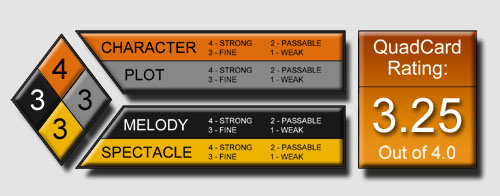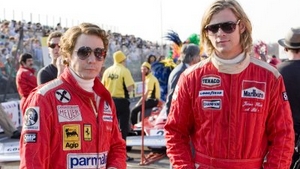 With so many box-office bombs populating cineplexes, it’s really comforting and refreshing to see another Ron Howard film on the big screen. Does anyone realize that there’s been 6 Fast & Furious movies made between Rush and A Beautiful Mind? Guess you can say it takes time to make a quality product, but it’s not to say Howard hasn’t kept busy since his Oscar win. While Howard’s films haven’t all been great, it’s safe to say he’s never made a bad film (we’re gonna cut him some slack and just forget about The Dilema, ok?). That said, when he’s on, he is on and most of his films – specifically the period pieces – are like a fine wine; full-bodied, sophisticated, vibrant, and weighty stories that linger on the tongue and leave you feeling entirely satisfied.
With so many box-office bombs populating cineplexes, it’s really comforting and refreshing to see another Ron Howard film on the big screen. Does anyone realize that there’s been 6 Fast & Furious movies made between Rush and A Beautiful Mind? Guess you can say it takes time to make a quality product, but it’s not to say Howard hasn’t kept busy since his Oscar win. While Howard’s films haven’t all been great, it’s safe to say he’s never made a bad film (we’re gonna cut him some slack and just forget about The Dilema, ok?). That said, when he’s on, he is on and most of his films – specifically the period pieces – are like a fine wine; full-bodied, sophisticated, vibrant, and weighty stories that linger on the tongue and leave you feeling entirely satisfied.
On par with, say, Spielberg (seriously, look at his resume, you 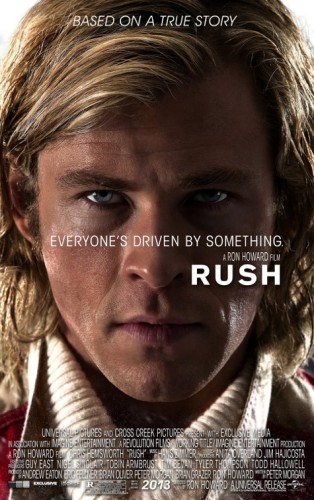 might have forgotten how many hits/fan-favorites he’s directed) with films like Apollo 13, A Beautiful Mind, and Frost/Nixon, Howard is right at home with period films…guess he learned a thing or two from Happy Days. This time, he focuses on another type of individual so complex and removed from our reality we can’t even comprehend the lifestyle, the choices, or even the banality of their profession. In Rush, Howard tells the tale of James Hunt (Chris Hemsworth) and Niki Lauda (Daniel Brühl), two of Formula 1 racing’s most famous drivers. Hunt and Lauda first met on the Formula 3 circuit, and they couldn’t have been more different. Hunt is the kind person – both on the track and off it – who is propelled by his own arrogance. He’s a fearless but reckless driver who doesn’t regard racing as dangerous. He spins Lauda out thus beginning their famous rivalry. Lauda really knows his stuff (whether it’s parts, aerodynamics, or just the mentality behind a race), and while he comes from a well-to-do family of wealthy businessmen, he shuns it to pursue his dream of racing.
might have forgotten how many hits/fan-favorites he’s directed) with films like Apollo 13, A Beautiful Mind, and Frost/Nixon, Howard is right at home with period films…guess he learned a thing or two from Happy Days. This time, he focuses on another type of individual so complex and removed from our reality we can’t even comprehend the lifestyle, the choices, or even the banality of their profession. In Rush, Howard tells the tale of James Hunt (Chris Hemsworth) and Niki Lauda (Daniel Brühl), two of Formula 1 racing’s most famous drivers. Hunt and Lauda first met on the Formula 3 circuit, and they couldn’t have been more different. Hunt is the kind person – both on the track and off it – who is propelled by his own arrogance. He’s a fearless but reckless driver who doesn’t regard racing as dangerous. He spins Lauda out thus beginning their famous rivalry. Lauda really knows his stuff (whether it’s parts, aerodynamics, or just the mentality behind a race), and while he comes from a well-to-do family of wealthy businessmen, he shuns it to pursue his dream of racing.
The leads are magnetic and both Hemsworth and Brühl own their characters. Racing aside, they have enough charisma, intrigue and personality to fill three movies; it’s just hypnotic to watch these two go at it. A battle of book smarts versus street smarts – Lauda is about precision and calculations and Hunt is pure gut instinct and headstrong to a fault – Rush is a 2 hour biopic that excels at characterizing their lifestyles and thought processes as the two are text book definitions of polar opposites. With a near perfect track record to prove it, Howard is superb at pulling emotion out of stories surrounding people and events many have no exposure to. Hunt and Lauda breath a world few will understand, but the racing is a very small part of this story.
The film is about what drives the man who drives a 500 horsepower coffin. They know the danger – Lauda calculates it as 20% risk every time he gets in the car – and, excitement aside, to do this for a living, one has to be a lunatic. In fact one of the best sequences in the movie involves a drive through the Italian countryside where Lauda is happened upon rather unexpectedly (and hilariously), by some fans to whom he disseminates more of his thought process “why should I take a risk when there’s nothing to gain from it?”. His beliefs change even more once he’s married; the idea that happiness weakens you has a lot of depth to it. Lauda fears happiness because now he has something to lose.
Chris Hemsworth has been consistently blowing up the screen, but even as his face takes complete ownership of the film’s poster (see above right), it is Daniel Brühl (Ingluorious Basterds) who deserves a lot of recognition as he very nearly makes this his movie. The rivalry to James Hunt and Niki Lauda (see what they really look like) leaps off the screen as Hunt is someone who just wants recognition and fame, versus Lauda who is driven because he’s figured out that precision and having the best machine is the key to winning.
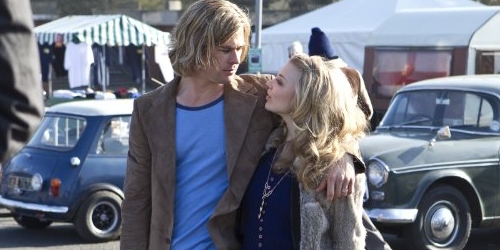
Lauda continually tells Hunt he needn’t be so aggressive, and that he needs to see the whole picture. But few things register with the bare-footed Bohemian playboy who has little-to-no cares. Hemsworth is a likeable actor, but he never makes you detest him, even if (as Hunt), he earns every crass word said against him. His brazen attitude is seen as unprofessional and immature. But he does what it takes to win. Even those in his crew admit he’s a loose cannon, yet his raw talent makes him so good that he’s worth the risk.
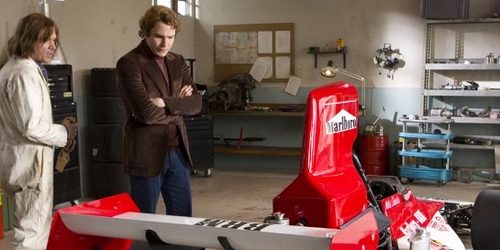
In a terrible but factual event, Lauda crashes and suffers horrific burns to his face and lungs. He spends 28 days in the hospital and all the while suffers through skin grafts and a barbaric means of recovery called “vacuuming the lungs”. Yet none of it hurts as bad as watching Hunt continuously win. It’s an unbearable recovery but 42 days later he’s racing again trying to keep the lead he has in this season. All the racing aside (which isn’t that much actually) Rush is a character study that resonates long after the checkered flag falls that finds Lauda, ever the professional, hard at work and figuring out ways to win next season while Hunt, typical of the happy-go-lucky lifestyle he leads, claims that he didn’t just win the biggest thing of his life so he could get back to work.
G-S-T RULING:
Ron Howard returns to form with this highly engaging and entertaining biopic. The look at the lives of these men and their pursuits, as well as their individual and highly contrasting mindsets (Hunt is a guy who cheats death but Lauda’s mindset is that being prepared to die is losing) is continually fascinating. Howard’s period-piece looks vintage, breathes authenticity including stellar music from Hans Zimmer that dips back to his Rock and, fittingly, Days of Thunder Days. But in a way it’s also timeless because Howard never loses focus of the human element; the film is about the men and much less about the vehicles they drive. Hemsworth and Brühl deliver magnetic performances and the high caliber of acting and their on-screen chemistry yields some of the best and most enjoyable repartee of any film this year.
